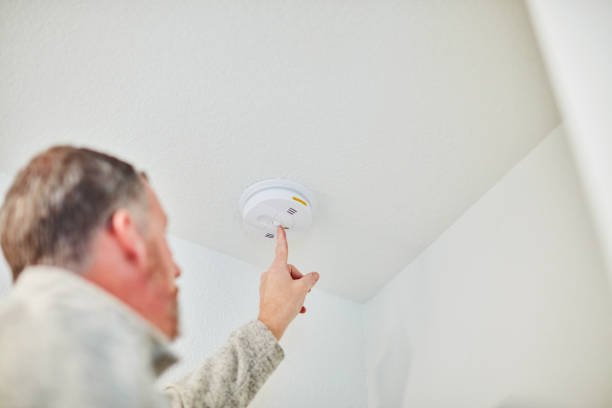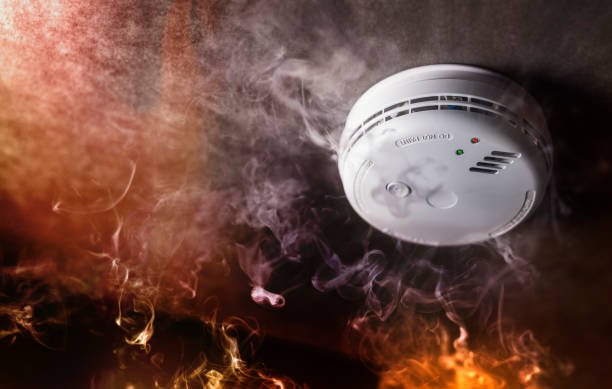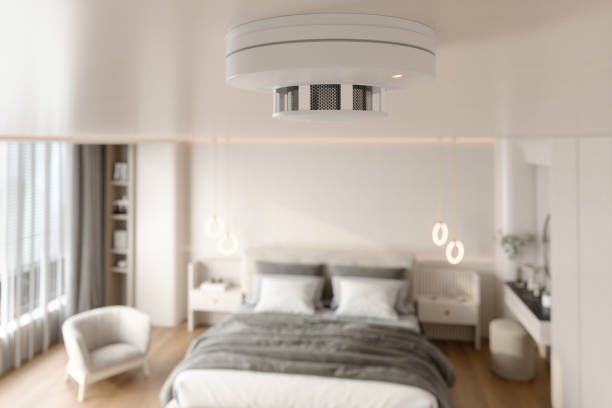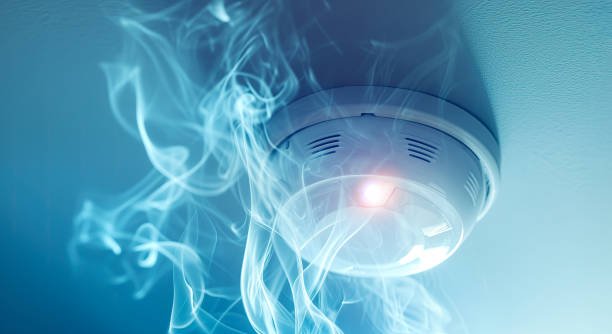1. Introduction
Like an anti-theft signal, smoke alarms are important devices in every house. They have features that raise the alert in someone’s presence or upon seeing smoke, which is crucial for a person and his other family members. However, if there is no apparent cause, the sound a Smoke Alarm emits while it chirps (which can be described as a short, high-pitched sound) can be irritating and confusing.
In this manual, we’ll show you the most likely reasons that make your smoke alarms chirp and the possible ways to troubleshoot and bypass any such issue.
2. What Does a Chirping Smoke Alarm Mean?
Differentiating Between Chirping, Beeping, and Alarming
The following set of sounds made by a smoke alarm can have crucial variations and it is pertinent to understand:
- Chirping: Sound registering between 30 to a minute, which is a single signalling that there is something wrong.
- Beeping: Quite loud regular sounds which syntactically hold the same pattern during their sequence indicating that there may be a threat of either smoke or a fire.
- Alarming: Typically, it can mean the signal being instructed is the exact opposite of being dormant or quiet – that the particular threat is real and has the potential to harm.
General Causes
As mentioned earlier chirping usually shows usual problems like low battery, a part that started working on an internal error or just a defective alarm that is old. Grasping these reasons is the beginning of solving the problem.
3. Common Causes of Smoke Alarm Chirping

Low Battery
Chirping is almost always the result of a low battery. It is common knowledge that there isn’t a smoke detector battery that is designed to blip or chirp – instead, when the device reaches a low battery it is preferable to have a functionality that emits a chirp.
- Solution: Use a new, robust battery instead. It must be installed well, ensuring that the positive and negative terminals are aligned as directed.
End of Life for Smoke Alarm
Smoke alarms cannot be used after the expiration of their operational life expectancy, which ranges from 7 to 10 years. During this time the devices would have accumulated wear and tear on the internal mechanisms forcing them to malfunction.
- Solution: The device has the date of manufacture inscribed on one side. In case the alarm has indeed expired its lifespan, do not be afraid to let go of it and buy a new one.
Dirt or Dust Buildup
Both dust and dirt tend to settle inside the smoke alarm which can interfere with the hardware, making it emit a chirping sound.
- Solution: Take off the device and use compressed air or a soft rag to clean it. Avoid any form of water or harmful chemicals while cleaning it.
4. How to Troubleshoot Your Smoke Alarm
Identifying the Problem
Recognising the problem is critical, however, the solutions one offers depend on the type of the problem. This is the reason why both recognising the issue and the problems are cardinal aspects. Here is what can help you do so:
- Note the chirping: The sound may be caused by a change in battery or due to lifetime alerts. Plenty more sounds can vary and help one to diagnose the issue at hand.
- Refer to the User Manual: Some units include descriptions that explain the reasons for chirping based on the device’s behaviour.
Testing the Device
To see whether or not the device is operational, press the “test” button on your alarm in order to perform the audible alarm test. If an audible alarm does not sound during the test, the alarm should be checked to see if it needs replacement or new batteries, or the battery may also require changing.
Checking Battery Placement
Even though a battery may have been replaced, an incorrectly placed battery can still lead to problems. Make sure the battery has been installed correctly to prevent issues or that the terminal connections are aligned properly and clean before replacing the battery.
5. When to Replace the Battery
How Often Should You Change It?
It is advisable that one should change smoke alarm batteries even though they may seem to be working every six months. Many homeowners sync this activity with turning their clocks an hour forward or back in the autumn and spring as recommended by experts for consistency.
Signs It’s Time for a New Battery
- The battery emits intermittent chirping.
- Indicator lights LED are either dim or blinking.
- When the testing of the alarm is done the time taken for it to respond is delayed.
Pro Tip
To avoid consistent battery replacement, buy long-lasting and good-quality batteries, as they will work effectively on the smoke alarm.
6. Dealing with End-of-Life Alarms
What Is End-of-Life Chirping?
When the internal parts of the smoke alarm have deteriorated significantly, end-of-life chirping becomes evident making it impossible for the smart home device to exhibit tobacco or a fire.
How to Confirm the Alarm Needs Replacement
- Look for the manufacturing date on the back or underside of the alarm.
- If the device is older than seven to ten years, it is advisable to replace the device.
Replacing the Device
Look out for new smoke alarms with long-life batteries, multi-device connectivity, or those that can be integrated with smart homes.
7. Environmental Factors That Cause Chirping

Temperature Changes
The performance of the smoke alarm can be affected by extreme temperature changes. This can be the case for alarms placed above or below the vents of HVAC units.
- Change: Moving the alarm from a place that has abrupt temperature variations.
Humidity Issues
High humidity or condensation can interfere with the device’s sensors, causing false alarms and chirping sounds.
- Change: Avoid putting alarms near bathtubs, washing rooms or other high-moisture regions.
Power Surges
Power surges can cause issues with smoke alarms that are hardwired into the electric system. They include Cisco systems including chirping that may be annoying.
- Change: Temporarily disconnect the alarm unit from the electrical supply and remove the battery for a few minutes. That should take care of the chirping.
8. Preventive Maintenance of Smoke Alarms
Regular Cleaning
Cleaning of smoke alarms should be done after three to six months to prevent dust and residues from accumulating. Use vacuum cleaner attachments or compressed air for best results.
Scheduled Battery Changes
To guarantee optimal performance of your smoke alarm system, it is highly recommended that you set aside reminders to change your smoke alarm batteries at least twice a year.
Using Quality Batteries
People should not use cheap or generic type of batteries, as they may not last long. Instead, they should go for good brands that make high-quality batteries.
9. Special Considerations for Smart Smoke Alarms
Smart smoke alarms have other important features like smart home integration and application notifications. They, however, come with different troubleshooting requirements.
How They Differ
- Smart alarms can trust issues easily thanks to apps that are connected with them; app users receive notifications of issues to be resolved.
- They usually contain rechargeable or sealed batteries which are said to have a lifespan of not less than 10 years.
Unique Troubleshooting Steps
- In case the alarm does not synchronize with the app you are using, first verify that both devices are connected to the same internet connection.
- And finally, ensure routine firmware updates.
10. What to Do When Troubleshooting Fails
When you have applied all measures to fix the alarm but it continues to produce chirping sounds, that should be a sign that it’s time to call a professional.
Professional Help Options
- Electricians can aid in regards to hardwired systems when there are electrical issues in smoke alarm systems.
- Home fire safety professionals can inspect your residential premises for the effective detection and use of smoke alarm systems.
Safety Measures Until Fixed
- Make sure that there is a temporary replacement device ready for use.
- Make your family aware of the problem and the strategies which are being utilised to solve this problem.
11. Importance of Smoke Alarm Placement
Best Locations for Installation
- Bedrooms: Every bedroom should have a smoke alarm.
- Hallways: If there are any sleeping areas, mount alarms in the hallways surrounding the sleeping areas.
- Every Level: There should be alarms on each level of the house including the basements.
Avoiding Problematic Areas
- Kitchens: To avoid false alarms, alarms should be mounted at least 10 feet away from the cooking range.
- Bathrooms: To reduce interference because of humidity, the alarms should be mounted away from showers or bathtubs.
12. Tips for Buying Reliable Smoke Alarms

Choosing Trusted Brands
Stay away from fire alarms that do not have a good review as well as are not UL certified or any other safety organisation’s certification.
Features to Look For
- Interconnectivity: This enables every alarm in the house to operate concurrently at the time of any danger.
- Battery Life: Select models where the batteries are sealed and are expected to last ten years.
- Smart Integration: Search for alarms that are in tandem with devices like Amazon Alexa or Google Home.
Understanding Warranty Options
With most alarms being reputable, they carry warranties between 5 to 10 years so read through these clauses to understand how secure your investment is.
13. Expert Insights
Fire Safety Expert Recommendations
“Smoke alarms are your first line of defence against household fires. Regular maintenance ensures they work effectively when needed most,” says fire safety expert Sarah Johnson.
Real-Life Stories of Smoke Alarms Saving Lives
Consider the case of a family in California whose smoke alarm alerted them to a kitchen fire in the middle of the night, allowing them to escape unharmed.
14. Future Trends in Smoke Alarm Technology
Innovations in Battery Life
Improvements in lithium batteries lead to low-maintenance alarm systems throughout their usage.
Smart Integration and AI Advancements
Alarms and detectors that use AI technology can tell the difference between smoke from cooking and an actual fire, stopping false alarms.
15. Conclusion
A chirping smoke alarm can be irritating; however, the peace of mind that such a simple piece of hardware to have and use says it all. The risk factors associated with the alarms can be eliminated by doing such things as knowing the cause, finding the problem, and maintaining the hardware efficiently to protect your residence.
Contact your family today, set off your alarms, and throw away dead batteries to keep your family safe. Always remember: an alarm that works saves lives!
FAQ’s
[saswp_tiny_multiple_faq headline-0=”h3″ question-0=”1. Why is my smoke alarm chirping even after I changed the battery?” answer-0=”If your smoke alarm continues chirping after replacing the battery, it could be due to improper battery installation, dirt or dust buildup, or the alarm reaching the end of its life. Double-check the battery placement and clean the device thoroughly. ” image-0=”” headline-1=”h3″ question-1=”2. How often should I replace my smoke alarm?” answer-1=”Smoke alarms should be replaced every 7–10 years, depending on the manufacturer’s recommendation. Check the manufacturing date on the back of the device to ensure it’s still within its effective lifespan. ” image-1=”” headline-2=”h3″ question-2=”3. Can a power outage cause my hardwired smoke alarm to chirp?” answer-2=”Yes, hardwired smoke alarms may chirp after a power outage due to a temporary loss of connection or residual battery drain. Resetting the alarm or replacing the backup battery can resolve this issue.” image-2=”” headline-3=”h3″ question-3=”4. Are there smoke alarms that don’t chirp for low batteries?” answer-3=”Modern smoke alarms with 10-year sealed lithium batteries are designed to eliminate the need for frequent battery replacements and don’t chirp for low battery warnings. They signal end-of-life instead.” image-3=”” headline-4=”h3″ question-4=”5. Can high humidity make my smoke alarm chirp?” answer-4=”Yes, high humidity can interfere with the sensors in your smoke alarm, potentially causing it to chirp. To avoid this, install alarms in dry, well-ventilated areas away from bathrooms or kitchens.” image-4=”” count=”5″ html=”true”]

1 thought on “Why Is My Smoke Alarm Chirping? Common Causes and Solutions”